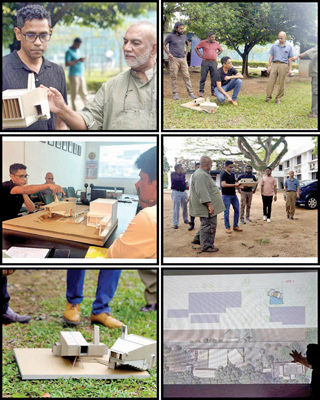 A new, hopeful dawn is breaking in the Sri Lankan film industry after years of struggle. Film halls are buzzing with enthusiastic cinema-goers, thanks to a wave of successful films. It all began with Asoka Handagama’s ‘Rani,’ which shattered box office records. Known for his art house cinema, Handagama surprised everyone by producing a film that resonated with a larger audience than ever before. ‘Rani’ has undoubtedly become his most viewed and discussed film to date.
A new, hopeful dawn is breaking in the Sri Lankan film industry after years of struggle. Film halls are buzzing with enthusiastic cinema-goers, thanks to a wave of successful films. It all began with Asoka Handagama’s ‘Rani,’ which shattered box office records. Known for his art house cinema, Handagama surprised everyone by producing a film that resonated with a larger audience than ever before. ‘Rani’ has undoubtedly become his most viewed and discussed film to date.
Following this success, Ilango Ram’s ‘Tentigo’ (Nelum Kuluna) took the baton, drawing crowds and sparking engaging conversations online. Looking ahead, there’s an exciting lineup of films to be released soon, including ‘Valampuri’ by Lakmal Dharmarathne, ‘Moda Tharindu’ by Thisara Imbulana, and ‘Bahuchithawadiya’ by Malaka Dewapriya, to name a few.
Amid this optimistic atmosphere, the National Film Corporation, led by newly appointed chairman Sudath Mahadiulwawe, is undergoing a transformation. Known for his dedication to improving cinema discourse and education, Mahadiulwawe is committed to implementing initiatives aimed at revitalising the Sri Lankan film industry.
In a conversation with him, we discussed his mission to reshape the National Film Corporation into a dynamic organisation that supports local cinema while connecting it to the international scene.

The mini theatre project in the premises of the
National Film Corporation
“I never dreamt of becoming the Chairman of the National Film Corporation. So, I initially declined the offer from my good friend and Minister of Cultural Affairs, Hiniduma Sunil Senevi. I worried about the criticism I’d face from fellow filmmakers, knowing how challenging it can be to navigate government organisations. However, we had a three-hour discussion, and he stressed that we need to transform this organisation into something truly productive.
The National Film Corporation plays a crucial role in advancing our cinema culture. When I asked about my freedom in this role, he said, “Sky’s the limit.” “It may sound cliché, but I know he meant it, and so far, I’ve felt the truth of those words. I took over the position with a clear mission, and I’m passionate about making it a reality.”
As Sudath Mahadiulwawe said, after taking his position at the National Film Corporation (NFC), he spent the first two months studying the organisation, its structure, and getting to know the staff and their roles. He typically starts his workday at 7 a.m., preparing for meetings by 9 a.m., and continues working late into the night.
“First of all, I wanted to understand the organisational structure and identify the key areas we need to focus on immediately,” he said. “We’ve pinpointed three main areas: the cinema industry, cinema art, and cinema education. These three elements together shape our cinema culture.”
With this vision in mind, Sudath is eager to launch projects without delay. “Although Sri Lanka has a cinema industry and culture that is over 80 years old, we still lack a proper film school,” he said. “Previous attempts were in the preschool stage, not fully developed institutions. Therefore, we hope to set up a fully-fledged cinema school this year.”
He also aims to revive the Colombo International Film Festival, which had only been held twice in the past. “I hope to make it an annual festival starting this year,” he said, emphasizing its importance in showcasing diverse cinematic talent.
Sudath also plans to set up a national cinema fund, drawing from Government, private, and international sources. “It’s well-known that some of the best films in the world have been produced with support from national or international funds,” he said. “This fund should be managed by an independent body of financial and legal professionals, and it must support every genre—from films with commercial potential to experimental projects that enrich our cinema culture and philosophy.”
Sudath believes that cinema should not be pigeonholed as either commercial or high art. “Any art with the potential to transform a human being is what truly matters,” he said.
He has held several meetings with potential stakeholders. “These initiatives won’t materialise overnight,” he said. “It takes quality time to gain the support of the right people and organisations. However, we remain hopeful about these three main projects, and we aim to see them take shape this year.”
Mini theatre halls

NFC Chairman Sudath Mahadiulwawe with
the producer guild. Pix by Shan Rambukwella
Recognising the size of the market and the limited resources available, Sudath Mahadiulwawe said that establishing mini theatre complexes in both urban and rural areas could be a game-changer for attracting audiences back to cinemas. While multiplex complexes have primarily targeted urban crowds in shopping malls, Sudath envisions mini theatre halls with a capacity of 50 to 60 seats for each screening as an effective alternative. “These smaller, intimate spaces can create a more engaging atmosphere for viewers,” he said, emphasizing the potential to foster a community-driven film experience.
Sudath is excited about plans to create a mini theatre complex in the premises of the National Film Corporation. “We are collaborating with expert architect Milinda Pathiraja, whose creative contributions will be invaluable in shaping this project,” he added. This mini theatre initiative aims to provide a welcoming environment tailored to local audiences, offering a diverse selection of films.
In a related venture, the Sri Lanka Film Directors’ Association submitted a proposal recently, to establish a new cinema system for local viewers. This ambitious project aims to build a significant number of fully equipped cinemas featuring cutting-edge technology and inviting atmospheres across 18 districts. “It is crucial that we lay a solid foundation for a new film culture and a thriving film industry through strong partnerships between the film industry and the National Film Corporation,” Sudath said, highlighting the positive impact these developments could have on local film audiences.
Thinking effectively and alternatively, Sudath recognises that these mini theatre ideas will play a vital role in reigniting a cinema culture, particularly among young people. By creating accessible and affordable venues, we can encourage the younger generation to engage with films as both an art form and a means of expression.
“When young audiences have the opportunity to explore diverse narratives and innovative storytelling in their own communities, it sparks interest and fosters a deeper appreciation for cinema,” he said. This renewed enthusiasm will not only cultivate future film lovers but also contribute to a vibrant and sustainable film industry.
By expanding access to cinema through mini theatres, Sudath envisions not only enhancing the film experience but also nurturing a new generation of cinema enthusiasts who appreciate the art of film in their communities. As a cinema educator, Sudath Mahadiulwawe is passionate about integrating cinema studies into school curricula. Despite the presence of libraries filled with books in every school, whether urban or rural, none have dedicated spaces for films. In many ways, cinema is still viewed in Sri Lanka as an adult art form, often considered unsuitable or even harmful for children and youth.
“Cinema is essentially a taboo subject in schools,” Sudath said. “In our culture, it’s considered an adult medium of art.” He had the opportunity to address a gathering of school principals, where he inquired about the presence of film collections in their libraries. “None of them had any films and many were even reluctant to entertain the idea,” he said, noting that they believed films were not appropriate for children.
Sudath emphasized the need to change these traditional and outdated attitudes. “We should introduce cinema as a subject in schools, just like we do with art, dance, music, and theatre. It’s a powerful medium that can significantly expand children’s imaginations and expose them to a vibrant world.”
One of his goals is to introduce a DVD rack in school libraries filled with age-appropriate films. “There are many films that are suitable for children,” he said. “Teachers can use these films to spark discussions about how cinema relates to our lives and helps us understand the world around us.”
He said that if cinema studies are included in the education system, it will cultivate a generation that understands this medium and is inspired to pursue cinema as a field of higher study. “Children who experience cinema in their school days are likely to be the same students who enroll in our cinema school and benefit from the film fund when they create their own films,” Sudath said.
This interconnected approach highlights the importance of starting cinema education at a young age. “By introducing these concepts in schools, we have the potential to develop a rich cinema culture in our country,” he said.
National Film Act
To further bolster the revitalisation of the Sri Lankan film industry, Sudath stresses the importance of having a practical National Film Act. “We need a legal framework that is not only modern but also flexible enough to adapt to the evolving landscape of cinema,” he said. “There’s a pressing need to amend the existing Film Act to ensure it opens new avenues for screening films in alternative formats and platforms. These amendments could pave the way for innovative distribution methods that align with contemporary viewing habits, thereby expanding the reach and accessibility of Sri Lankan cinema.”
Currently, Sudath is studying the existing film act, identifying areas that require revision to foster a robust national cinema that resonates on a global scale. “Our goal is to create a strong foundation that empowers filmmakers and nurtures diverse cinematic voices,” he said. By making these crucial changes, the National Film Corporation aims not only to support local filmmakers but also to elevate Sri Lankan films on the international stage. With a vision for an inclusive and forward-thinking film industry, Sudath is dedicated to ensuring that Sri Lanka’s cinematic future is bright, vibrant, and globally impactful.




